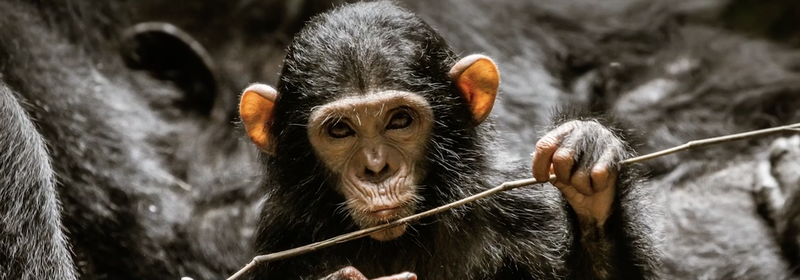There are no roads to this jungle: Discover a chimp’s kingdom
Updated | By Beautiful News
One of the world’s largest groups of wild chimpanzees live in the Mahale Mountains National Park of Tanzania.

On the shores of Lake Tanganyika, clear waters shift and sigh onto the sand as the rising sun glows above the treetops. The jungle rustles to life. Deep in the mountains, a screech erupts. Somewhere, a chimpanzee is up and wide awake, ready to meet the morning.
One of the world’s largest groups of wild chimpanzees live in the Mahale Mountains National Park of Tanzania. Established in 1985, the remote reserve must be traversed on foot due to the intentional lack of roads. Tourists to Mahale fly in, and then take a boat ride before their arrival at camp. Such limited access to the region allows the chimpanzee population here to flourish without human interference.
Around 900 chimpanzees dwell in this verdant land. Highly social animals, familial ties are of utmost importance to the primates. Each one has their own distinctive ‘pant-hoot’, a recognisable call to help them pinpoint each other in the dense forest. These mammals mostly live in small groups called ‘parties’, with several parties making up larger squads called ‘communities’. As we sit and preen in salons, so too do our ape brethren inspect each other’s hair. We’re also not the only species to find things amusing – these primates chortle as they cavort under their leafy canopies.
We share over 95% of our DNA with chimpanzees. After decades of research, many behavioural links have been observed. The making and use of tools by chimpanzees was first noted by pioneering primatologist Dr Jane Goodall, a discovery that rocked the world. Until that moment, a defining and exclusive feature of humankind was our ability to do what a chimpanzee had already done.
However, our evolutionary ability to wield tools is far more sophisticated and destructive, enabling us to wreak havoc upon their habitat. Forests along Africa’s equatorial green belt are disappearing and with it, the only home of wild chimps. The sprawl of illegal loggers also increases poaching, another threat to these animals. But teams like the one at the Mahale Mountains National Park are sowing their time, resources, and energy into protecting these intelligent and vulnerable chimpanzees. Efforts at conserving the endangered species must succeed. We’re family after all.
Images by Scott Ramsay were used in the creation of this film.
For more Beautiful News stories see below:- Stigma tried to silence us, but our voices were louder
- Why Darling lives up to its unusual name
- I’m in your corner: The boxer coaching youth to block life’s blows
- Nourishing a community: When people can’t eat, neither can their pets
- How to defy the status quo and uncage your potential
In the face of the COVID-19 crisis, you can help us spread information and hope. Share your positive stories by clicking here and we’ll be in contact.
Show's Stories
-
Temu’s got a local warehouse in SA
Temu has just launched its first warehouse in South Africa! Here’s what ...
East Coast Breakfast 1 day, 14 hours ago -
Green ID book production to be discontinued in SA
The Department of Home Affairs is planning to phase out the green ID boo...
Stacey & J Sbu 1 day, 17 hours ago